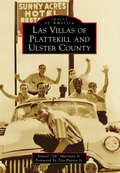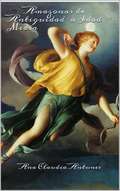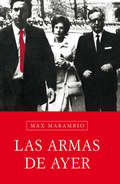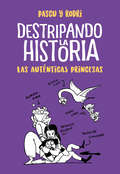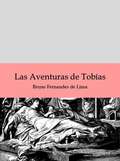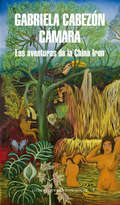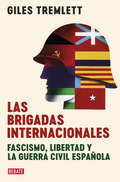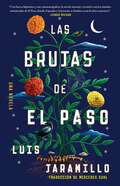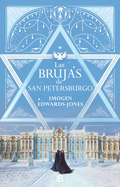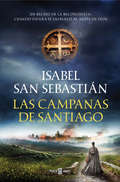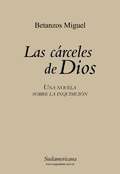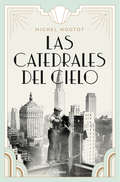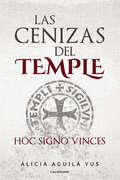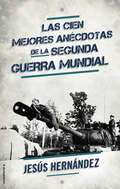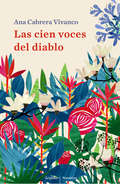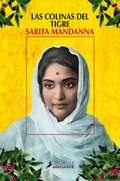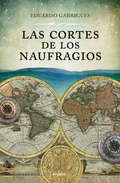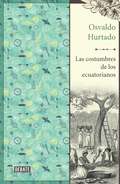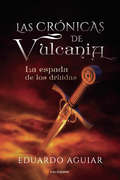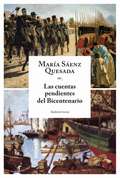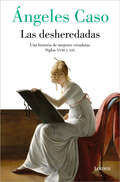- Table View
- List View
Las Villas of Plattekill and Ulster County (Images of America)
by Tito Puente Jr. Ismael Ish" Martinez Jr.This is the first comprehensive historical retrospective on Las Villas of Plattekill and Ulster County ever written. Ulster County was first settled in 1652 and officially became a county in 1683. Its rural nature, scenic beauty, and the Catskill Mountains have made it a popular vacation destination since the 19th century. Described in numerous news articles as the Spanish Alps, Las Villas, as they were collectively known, was a lively enclave of Spanish, Puerto Rican, and other Hispanic summer resorts in Plattekill, New York, and the Catskill Mountains. Starting in the 1920s and for the next 60 years, the area became the most popular vacation destination for Latinos in the Northeast, with an emphasis on music, food, language, and customs.
Las amazonas de la Antigüedad a la Edad Media
by Ana Bowlova Ana Claudia AntunesComo las Amazonas entraron en la Amazonía, y mas, en el reino imaginario y se convirtieron en leyendas, ¿cómo se procesa de manera que todavía se conocerían hasta nuestros días modernos, e incluso más, todavía caminan entre nosotros? Usted va a ampliar sus conocimientos de la antigua Grecia, hasta la Edad Media con relatos en primera persona acerca de cómo llegaron las amazonas, lo que hicieron, cómo se enfrentaron, lo que comían y donde, que conocieron y los riesgos y peligros que pasaron a sufrir hasta que se convirtieron en verdaderas leyendas vivientes, porque hasta ahora es que existen. Un cuento muy atractivo, en ritmo galopante y movimiento frenetico y sorprendente a la vez que hará que usted se pregunte si todo esto era verdad o sólo una parte de lo que forma el alma colectiva. Y así, la verdad relativa en relación con los hechos expone el núcleo de la realidad. Y entonces, serían simplemente sueños, fantasías, diosas que vivieron en la Tierra mucho antes de que se colonizaron en verdad? Siéntase parte del mundo de las Amazonas en este libro que revela la síntesis del conocimiento humano dentro de los parámetros de la conciencia colectiva existentes.
Las armas de ayer
by Max MarambioTreinta y cinco años después del martes 11 de septiembre que terminó conel sueño revolucionario y con la paz en Chile, este libro nos narracapítulos desconocidos de la historia de la insurgencia armada en elpaís y sus principales protagonistas a través del relato de uno de lostestigos privilegiados de aquellos convulsos años: un joven militante deizquierda cuyas convicciones revolucionarias le llevan a situarse en lavanguardia de los acontecimientos capitales de una generación. Formadoen la Cuba revolucionaria junto a Fidel Castro, tras la muerte del Cheregresa a Chile, donde milita en la clandestinidad del MIR. En 1971abandona el partido y se convierte, con tan solo veintitrés años, enresponsable de la guardia personal de Allende. Una vez consumado elataque al Palacio de la Moneda, el joven revolucionario se asigna unaúltima misión desesperada: defender la Embajada de Cuba y conseguir queel arsenal de armas abandonado por los cubanos sea entregado a laresistencia, que trata de escapar a la represión del ejército dePinochet. Su fascinante relato de los diez largos meses de resistenciaen la embajada, junto a los refugiados y perseguidos del nuevo régimen,pertenece a la odisea de los héroes anónimos de aquellos días.
Las armas del alba: Guerra En El Paraíso / Las Armas Del Alba (Narradores Contemporáneos Ser.)
by Carlos MontemayorLas armas del alba es la primera investigación sistemática, minuciosa y a fondo de los acontecimientos históricos del inicio de la guerrilla mexicana y su primera expresión literaria plena. "La novela restituye memoria y dignidad. Montemayor lo hace con habilidad literaria y admirable firmeza civil." Giovanni Gentile G. Marchetti, Universidad de Bolonia. El 23 de septiembre de 1965, un puñado de guerrilleros atacó el cuartel militar de Ciudad Madera, en el estado de Chihuahua. Este breve acto marcó el surgimiento de las guerrillas en la historia reciente de México y sirvió como inspiración a futuros levantamientos armados en el país. Las armas del alba es una novela donde los personajes luchan contra su destino y cuyo sacrificio sirvió para que los poderosos escucharan la voz de los explotados. Estamos ante una brillante narración, inspirada por hechos reales que sacudieron la estructura de poder en México.
Las auténticas princesas (Destripando la historia #Volumen)
by Rodrigo Septien Alvaro Pascual¡Descubre el próximo libro de «Destripando la historia»! ¿Sabías que las princesas que crees conocer tienen los orígenes más locos y sorprendentes? ¿Te imaginas lo fascinantes que pudieron llegar a ser las vidas de algunas de las princesas de la historia? ¿Y que hay cuentos tan extraños y alocados que nadie te los ha contado nunca? Este libro te desvela, te descubre y te destripa las historias de las princesas más fascinantes que jamás se han contado. ¡Con contenido inédito, nuevas princesas y las ilustraciones desternillantes de las famosas canciones de «Destripando la historia»!
Las aventuras de Tobías
by Bruno Fernandes de LimaTobías era un joven hebreo que vivió en la época del cautiverio babilónico. Su padre, Tobit, sufrió un accidente que le dejó ciego. Tobías emprende entonces un viaje a petición de su padre, que resulta ser una gran aventura que cambia su vida y la de su familia para siempre. “Las aventuras de Tobías” es una relectura de uno de los libros Deuterocanónicos de la Biblia Católica. Esta novela es una mezcla de sucesos bíblicos y ficción.
Las aventuras de la China Iron
by Gabriela Cabezón CámaraLa refundación más radical del clásico Martín Fierro: aquí, la protagonista es su "China", que a los 14 años aprovecha que a él se lo lleva la leva para salir al mundo. Radiante, luminoso. El desierto es un prisma de perros, cardos, polvo y cielo. La China Iron acompaña a Liz, una inglesa que va tras su marido llevado por la leva. Ella, en cambio, no busca a Martín Fierro, ese gaucho que se la ganó en un partido de truco. La China escapa. Y es su viaje exploración: de la textura de la seda, del sabor del té, del sofoco en que estalla el sexo. Descubre palabras. Sonidos nuevos para cosas que antes no existían. Pasan del desierto al fortín, un experimento social que intenta transformar a una masa de criollos brutos en los ciudadanos industriosos que pide la Nación. Pero será en las tolderías que la China y su feliz comitiva encontrarán el Paraíso. También allí, Gabriela Cabezón Cámara reanima su pertinaz aventura literaria: la de fundar un mundo libre, en el que las criaturas se abracen por deseo y gocen el mismo amor de ríos, pájaros y árboles. Y no se sientan solas jamás. «El estilo de Cabezón Cámara es inconfundible, y eso se puede decir de pocos escritores en la literatura argentina. Sólo queda esperar que su ritmo gozoso y sus frases cultísimas y, al mismo tiempo, reventadas se repitan hasta olvidar el nombre de la autora, como se dice un verso de tango o del mismo Martín Fierro.»María Moreno, Ñ
Las aventuras de la vanguardia: El arte moderno contra la modernidad
by Juan José SebreliSebreli descubre el acceso a uno de los relatos más apasionados de laactualidad: la historia de los movimientos y las vanguardias artísticasdel siglo XX. Su incursión no solo invita a transitar las distintastendencias sino a pensar acerca de las conductas y los acontecimientosque las hicieron posibles. Entre el logro técnico y la impostura exhibicionista, entre laconformidad crítica y el prestigio clandestino, entre la operaciónsolitaria y la megalomanía, Sebreli advierte los síntomas de malestar enla cultura, los matices de hastío de quienes determinan el valor de laobra de arte -museos, mecenas y otras instituciones- y los reclamos deorden y jerarquías que precipitan el relevo, las continuidades yrupturas. Con su agudeza acostumbrada, hace desfilar ante nuestros ojosdiversas manifestaciones de acatamiento ante el totalitarismo estatal yla dictadura de mercado.Los puntos de vista del autor de «El asedio a la modernidad» y «Elvacilar de las cosas» nos persuaden por su atrevimiento y su riquezaintelectual tanto cuando adopta una posición firmemente argumentativacomo cuando sostiene hipótesis riesgosas. El estilo de Sebreli es ya unade las definiciones más certeras e imprevisibles de nuestra época.
Las brigadas internacionales: Fascismo, libertad y la guerra civil española
by Giles TremlettLa primera historia completa de las Brigadas Internacionales, un episodio épico, repleto de sangre e ideales, en la lucha contra el fascismo. La Guerra Civil española fue el primer conflicto armado contra el fascismo, y un símbolo para toda una generación. Más de treinta y cinco mil voluntarios de sesenta países acudieron a defender la democracia de las tropas de Franco, Hitler y Mussolini.Desorganizados y mal equipados, pero animados por una ilusión compartida y el ansia de gloria, grupos heterogéneos de jóvenes idealistas, hombres y mujeres, se unieron para crear una ejército voluntario de un tamaño nunca visto desde las Cruzadas: las Brigadas Internacionales. Estos apasionados combatientes por la libertad venían de toda Europa, de China, de África y del continente americano para unirse a la causa de la República y luchar durante dos años en las sangrientas batallas de Madrid, el Jarama y el Ebro. ¿Fueron héroes o ilusos? ¿Santos laicos o aventureros sanguinarios? ¿Y qué lograron exactamente? Esta historia se ha contado en los libros de Orwell, Malraux y Hemingway, los cuadros de Picasso y las fotos de Capa y Taro, pero en esta obra magistral el premiado historiador Giles Tremlett cuenta por primera vez los hechos de la Guerra Civil a través de las experiencias de este extraordinario grupo humano. A partir de los amplios archivos de las Brigadas en Moscú, los documentos de la Comintern e infinidad de testimonios de primera mano, Tremlett logra reflejar el drama y la pasión del heroico esfuerzo por detener al fascismo en Europa. Reseñas:«La valentía y el sacrificio de los voluntarios que acudieron a España de todas partes del mundo para combatir el fascismo siguen despertando el interés por la Guerra Civil. Muchos de los miles de libros sobre el conflicto son sobre las Brigadas Internacionales, pero no hay ninguno como la crónica, tan emocionante como ilustrativa,de Giles Tremlett. Llena de citas y anécdotas memorables, supone, en una prosa viva y brillante, la historia completa de las Brigadas que se echaba en falta.»Paul Preston «La primera historia completa de las Brigadas Internacionales, de una erudición destacable, pero de lectura ágil y amena.»Book of the Day, The Guardian «Magnífico. Historia narrativa en su forma más vívida y convincente.»Fergal Keane
Las brujas de El Paso, Spanish-language edition of The Witches of El Paso
by Luis JaramilloUna abogada y su anciana tía abuela utilizan sus dones supernaturales para encontrar a una niña perdida en esta &“asombrosa novela que rompe los esquemas del género y trata de la magia que canta a nuestro alrededor&” (Julia Phillips, autora de Dissapearing Earth), siguiendo la misma línea de La herencia de la orquídea divina y La hacienda.Las brujas no existen, pero llegan cuando se las invoca. 1943, El Paso, Texas: Nena, una adolescente, pasa sus días a cargo de los bebés de sus hermanas mayores mientras anhela una vida de aventura. Las premoniciones y desmayos que ha tenido que soportar desde su infancia vienen empeorando, y a Nena le preocupa acabar como la vieja curandera que vive en su misma calle, y que atemoriza a todos. Reza pidiendo algún tipo de ayuda y, cuando una noche muy tarde se aparece sor Benedicta, Nena la seguirá para cruzar fronteras en el espacio y el tiempo. En el México de la Colonia, Nena llegará a dominar sus poderes, encontrará el amor y aprenderá que la magia siempre tiene un precio. En el presente, Marta, la sobrina nieta de Nena, se esfuerza por mantener el equilibrio entre su trabajo como abogada en un despacho, sus hijos y el cuidado de su tía abuela de noventa y tres años. Cuando Marta accede a ayudarle a encontrar a la hija perdida que dejó en el pasado, se forja una fuerte conexión entre ambas. Los poderes sobrenaturales de Marta afloran, despertando nuevas posibilidades en ella, que amenazan la vida que ha construido hasta entonces. A lawyer and her elderly great-aunt use their supernatural gifts to find a lost child in this &“wild, wondrous novel about the magic that is singing all around us&” (Julia Phillips, author of Disappearing Earth)—in the vein of The Inheritance of Orquídea Divina and La Hacienda. If you call to the witches, they will come. 1943, El Paso, Texas: teenager Nena spends her days caring for the small children of her older sisters and longing for a life of adventure. The premonitions and fainting spells she has endured since childhood are getting worse, and Nena worries she&’ll end up like the scary old curandera down the street. Nena prays for help, and when the mysterious Sister Benedicta arrives late one night, Nena follows her across the borders of space and time. In colonial Mexico, Nena grows into her power, finding love and learning that magic always comes with a price. In the present day, Nena&’s grandniece, Marta, balances a struggling legal aid practice with motherhood and the care of the now ninety-three-year-old Nena. When Marta agrees to help search for a daughter Nena left in the past, the two forge a fierce connection. Marta&’s own supernatural powers emerge, awakening her to new possibilities that threaten the life she has constructed. &“Sexy, smart, and soulful, Luis Jaramillo&’s The Witches of El Paso pulls us across borders and time to get to the essence of what it means for families to survive this beautiful, fractured world&” (Mira Jacob, author of Good Talk).
Las brujas de San Petersburgo
by Imogen Edwards JonesUn retrato oscuro e inquietante sobre la corte de los Romanov y dos mujeres que no se conformaron con el destino que les tenía reservado la Historia. Militza y Stana, hijas del empobrecido rey de Montenegro, se ven forzadas a casarse con dos miembros de la aristocracia rusa para que su padre pueda recuperar parte de su poder. La vida, a pesar del esplendor de la corte del zar Nicolás, no es fácil. Una de ellas, Militza, parece tener poderes ocultos y siente fascinación por todo lo que tenga que ver con la magia y el espiritismo. Ante una influenciable zarina Alexandra, que haría cualquier cosa para darle al país el heredero que está esperando, despliegan su relación con el más allá, y entre sesiones de espiritismo, pócimas engañosas y coqueteos con la magia negra, logran hacerse con un gran poder en la corte. Sin embargo, cuando den con Rasputín, precisamente en la búsqueda de un hombre con poder espiritual, descubrirán que quizás han ido demasiado lejos.
Las campanas de Santiago
by Isabel San SebastiánLa autora de novela histórica más leída de nuestro país regresa con su proyecto más ambicioso: la apasionante aventura que forjó la España moderna, la Reconquista. Compostela, año 997 de Nuestro Señor. Almanzor, «el Azote de Dios», se dispone a destruir la ciudad del apóstol Santiago, faro de la Cristiandad hispana y destino de un camino de peregrinación secular. En medio de la confusión, Tiago, un humilde herrero, se separa de su mujer, Mencía, embarazada de una criatura. Ella consigue huir. Él es capturado y forzado a cargar junto con otros prisioneros las campanas de la basílica hasta Córdoba en un viaje plagado de peligros. Comienza así una aventura trepidante que obligará a Mencía a luchar por sobrevivir mientras Tiago intenta desesperadamente regresar a su lado. Reseña:«Una extraordinaria novela de sólida arquitectura argumental, escritura transparente, profundidad psicológica, sólida cimentación literaria e interés que no decae en ningún momento.»El Cultural
Las carceles de Dios: Una novela sobre la Inquisición
by Miguel BetanzosLas cárceles de Dios. Una novela sobre la inquisición de MiguelBetanzos: Después de leer esta novela, su idea sobre la Inquisición yano será la misma. El protagonista de esta novela, Felipe Zamora, trabaja como guardiacárcel en los sótanos del Santo Oficio de la Inquisición. El escenarioes la España sombría y opresiva de finales del siglo XVI, asaltada porlas duras controversias religiosas entre judíos, musulmanes ycristianos. Felipe es hombre de genio rudo y pocas luces, aunque enocasiones su temple se vuelve algo picaresco y fuera de lo común. Surelación con los reos es un tanto ambigua: conversa con ellos, se apiadade sus padecimientos y suele acercarles un tazón de leche calientecuando aprietan los fríos del invierno. Pero, al mismo tiempo, su oficiolo obliga a manejar los instrumentos de tortura y a preparar a loscondenados para la hoguera. Cierto día ve pasar a una dama frente alpalacio inquisitorial y queda prendado de su belleza. Para ganarse sucorazón le escribirá una serie de cartas hablándole de si mismo, de suspreocupaciones y de su oscura vida en los sótanos del Santo Oficio.Aunque se reconoce "algo flojo de mollera", Felipe también desea serpoeta y, con la ayuda de uno de los reos, el judío Martín de Lara,intentara componer versos que lleguen al corazón de su amada. Así,gracias a aquellas cartas y al amor incondicional por la belladesconocida, asistiremos al fascinante submundo de las cárcelesinquisitoriales: brujas, judíos, herejes, sacrílegos, apostatas, asícomo también al controvertido y polémico proceder de los propiosinquisidores. Un mundo de caprichos perpetrados en nombre de Dios, através de la mirada cándida de un hombre ingenuo y, además, enamorado.Miguel Betanzos vuelve a demostrar aquí que solo una buena historia,narrada desde la piel de sus protagonistas, nos permite revivir lasluces y las sombras del pasado. A partir de las cárceles de Dios nuestraidea de la Inquisición ya no será la misma y. Por su parte, FelipeZamora pasaraa integrar la galería de personajes novelescos masentrañables.
Las catedrales del cielo
by Michel MoutotUn viaje extraordinario y épico por tres generaciones de una estirpe de obreros sin vértigo que construyeron auténticas catedrales de acero. Nueva York, 11 de septiembre de 2001. John LaLiberté, un indio mohawk y trabajador del acero como sus antepasados, acaba de presenciar el derrumbe de las Torres Gemelas y, soplete en mano, penetra como voluntario en ese infierno de la Zona Cero cortando las vigas en búsqueda de supervivientes. La historia de su familia está ligada a la silueta urbana de Nueva York. Su propio padre participó en la construcción de esas mismas Torres. Nueva York, 1968. Jack LaLiberté participa en la construcción de las llamadas Torres Gemelas. Esta obra colosal ha creado una gran expectación y se convertirán en los rascacielos más altos del mundo hasta entonces. Durante unos días lo acompaña por la ciudad su hijo John, quien años más tarde seguirá los pasos de su padre como ironworker igual que Jack siguió los del suyo y abandonó la reserva para aprender el oficio que ha unido las últimas generaciones de indios mohawks. Kahnawake (Canadá), 1886. Un grupo de adolescentes de la tribu de los mohawks, entre ellos Manish, aprende el oficio de montadores y remachadores de estructuras metálicas. Los aprendices se inician en una obra ferroviaria que pretende unir Canadá y Estados Unidos mediante un puente sobre el río San Lorenzo. Pronto comienza a correr la leyenda de que los hombres de esa tribu no conocen el vértigo y que por eso son capaces de trabajar donde otros no se atreverían ni a subirse. Manish LaLiberté encabeza una saga de trabajadores del acero que transformará el corazón de Nueva York: desde las primeras construcciones del siglo XX hasta las Torres Gemelas y la posterior construcción de la Torre de la Libertad. Tres generaciones de una familia de indios mohawks han levantado la silueta urbana de Nueva York a lo largo del siglo XX. En esta apasionante novela se descubre la historia de esta estirpe de trabajadores del acero que trepó a las alturas para construir los rascacielos más emblemáticos de la ciudad. Padres e hijos, y antes los abuelos de esta singular tribu americana, han caminado por donde nadie antes lo había hecho: por el cielo, junto a las águilas. Reseñas:«Me encanta cómo Moutot combina las diferentes historias reales y ficticias dotando de un aire épico a la novela. Se trata casi de un libro de aventuras donde los mohawks cuentan su orgullo de pertenecer a un pueblo de constructores.» L'Express «Entre información y ficción, Michel Moutot encuentra el equilibro y firma un libro por momentos vertiginoso.»Télérama «Una obra monumental. Una novela documental de un ingenio insólito. Un fresco brillante. Moutot nos eleva sobre el vacío, sobre esas vigas inestables donde los mohawks, artesanos del acero, sueñan con encontrarse.» Unwalkers
Las catedrales del cielo
by Michel MoutotUn viaje extraordinario y épico por tres generaciones de una estirpe de obreros sin vértigo que construyeron auténticas catedrales de acero. Nueva York, 11 de septiembre de 2001. John LaLiberté, un indio mohawk y trabajador del acero como sus antepasados, acaba de presenciar el derrumbe de las Torres Gemelas y, soplete en mano, penetra como voluntario en ese infierno de la Zona Cero cortando las vigas en búsqueda de supervivientes. La historia de su familia está ligada a la silueta urbana de Nueva York. Su propio padre participó en la construcción de esas mismas Torres. Nueva York, 1968. Jack LaLiberté participa en la construcción de las llamadas Torres Gemelas. Esta obra colosal ha creado una gran expectación y se convertirá en los rascacielos más altos del mundo hasta entonces. Durante unos días lo acompaña por la ciudad su hijo John, quien años más tarde seguirá los pasos de su padre como ironworker igual que Jack siguió los del suyo y abandonó la reserva para aprender el oficio que ha unido las últimas generaciones de indios mohawks. Kahnawake (Canadá), 1886. Un grupo de adolescentes de la tribu de los mohawks, entre ellos Manish, aprende el oficio de montadores y remachadores de estructuras metálicas. Los aprendices se inician en una obra ferroviaria que pretende unir Canadá y Estados Unidos mediante un puente sobre el río San Lorenzo. Pronto comienza a correr la leyenda de que los hombres de esa tribu no conocen el vértigo y que por eso son capaces de trabajar donde otros no se atreverían ni a subirse. Manish LaLiberté encabeza una saga de trabajadores del acero que transformará el corazón de Nueva York: desde las primeras construcciones del siglo XX hasta las Torres Gemelas y la posterior construcción de la Torre de la Libertad. Tres generaciones de una familia de indios mohawks han levantado la silueta urbana de Nueva York a lo largo del siglo XX. En esta apasionante novela se descubre la historia de esta estirpe de trabajadores del acero que trepó a las alturas para construir los rascacielos más emblemáticos de la ciudad. Padres e hijos, y antes los abuelos de esta singular tribu americana, han caminado por donde nadie antes lo había hecho: por el cielo, junto a las águilas. Reseñas:«Me encanta cómo Moutot combina las diferentes historias reales y ficticias dotando de un aire épico a la novela. Se trata casi de un libro de aventuras donde los mohawks cuentan su orgullo de pertenecer a un pueblo de constructores.» L'Express «Entre información y ficción, Michel Moutot encuentra el equilibro y firma un libro por momentos vertiginoso.»Télérama «Una obra monumental. Una novela documental de un ingenio insólito. Un fresco brillante. Moutot nos eleva sobre el vacío, sobre esas vigasinestables donde los mohawks, artesanos del acero, sueñan con encontrarse.» Unwalkers
Las cenizas del Temple: Hoc signo vinces
by Alícia Aguilá YusUn secreto que puede hacer temblar los cimientos del mundo occidental. Una llamada de teléfono hace que la rutinaria vida de Ítaca Blanchard, una profesora de Historia Medieval, cambie para siempre. Una llamada que provoca que se reabran viejas heridas, que se reencuentre con un amor perdido y que inicie una búsqueda que podría cambiar el curso de la historia. ¿Y si sus pasos le llevaran a descubrir que su vida se construye sobre una farsa? ¿Y si las mentirasde un pasado familiar turbulento comienzan a hacer tambalear su presente? La muerte y los secretos se ciernen sobre ella, sin ser consciente de que sus investigaciones deben ir mucho más allá de lo que creía.
Las cien mejores anécdotas de la Segunda Guerra Mundial
by Jesús HernándezUno de los libros de referencia de historia militar en la última década en nuestro país. Un libro repleto de aquellos sorprendentes detalles, de lo cotidiano del conflicto, que también fueron decisivos para definir el cambio de rumbo de la Historia. Jesús Hernández ha investigado un poco más allá de estrategias y versiones oficiales para crear este anecdotario, y arrancar así una sonrisa o alguna que otra cara de asombro.El libro aporta, además del centenar de anécdotas, otro capítulo destinado a curiosidades y un espacio destinado a pequeños récords, como la bomba más pesada o el piloto más condecorado
Las cien voces del diablo
by Ana CabreraEra un hombre sin final, uno de aquellos que te matan de gusto en la cama, se van sin decir adiós y la dejan a una muerta pero agradecida de por vida.Los amores irrefrenables y desbordantes de Jacinto siembran la caribeña Villa Veneno de una estela de pasiones prohibidas, de las que nace un joven cuyo destino se verá irremediablemente marcado por la tragedia. En un pueblo donde el aire huele a orquídeas, las mentiras se retuercen como enredaderas y el amor crece en las espeinas de las rosas, un día la tentación y la culpa amenazan con cobrar su precio a sus habitantes.Una historia arrolladora y sensual que envuelve al lector en un torbellino de pasiones y secretos, y que Ana Cabrera Vivanco narra con una magnífica voz propia tan audaz como subyugante.
Las colinas del tigre
by Sarita MandannaSituada en una de las regiones más fértiles y hermosas del sur de la India, en las últimas décadas del siglo XIX, esta magnífica historia de amor nos envuelve como un manto mágico. En el centro de esta historia, la cautivadora figura de Devi, que, desde su posición de hija predilecta de una familia que la adora, será el hilo conductor que nos descubrirá las vicisitudes de unos personajes de variados matices. Séptimo retoño de los Nachimanda, el hecho de ser la primera niña nacida en sesenta y cinco años hará que Devi sea tratada con una veneración rayana en la idolatría. Criada en un ambiente de alegría y felicidad, la irrupción del pequeño Devanna, que llega a la comunidad dejando atrás una tragedia familiar, supone un punto de inflexión en la vida de Devi. El agudo contraste entre dos realidades tan dispares no es óbice para que los dos niños se vuelvan inseparables. Sin embargo, todo cambia la noche en que Devi conoce a un apuesto cazador de tigres y se promete solemnemente que éste será el hombre de su vida. Nace así un amor irreductible que, pese a salvar numerosos obstáculos y afianzarse con los años, traerá consigo terribles consecuencias que marcarán la historia familiar. Originaria de la región de Coorg -conocida como la Escocia de la India-, la autora ha recreado un universo rico tanto en sus tradiciones culturales como en la profundidad de las emociones que viven sus personajes.
Las cortes de los naufragios
by Eduardo GarriguesFray Servando Teresa de Mier, el cura Miguel Hidalgo, Juan López de Cancelada, Xavier Mina y el general Allende son algunos de los personajes de esta divertida novela sobre la construcción de México como nación. Eduardo Garrigues narra la visión del final de la Colonia y la gestación de la Independencia de México. Con una imaginería mestiza y divertida, el autor recrea los momentos independentistas, y contrapone la visión de dos bandos en un país en vías de construcción. Cuando don Pedro Bautista Pino es invitado a participar en la convocatoria para ser diputado de las Cortes de Cádiz y contrarrestar los movimientos revolucionarios que tan preocupados tenían a los españoles, se lleva con él a Juan de los Reyes Baca y Pino. En su viaje a Cádiz también los acompañarán Bartolomé, escribano y maestro de Juan, e Hilario Padilla, indio navajo e iniciador del joven en las leyendas y sortilegios indígenas. Debido a las vicisitudes que transcurren en el camino, Juan acabará poniendo en duda la visión conservadora del entorno de su abuelo, pero también llegará a desmitificar las figuras de los héroes revolucionarios, cuando los acontecimientos pongan en evidencia sus métodos violentos y sus intereses personales. Fray Servando Teresa de Mier, el cura Miguel Hidalgo, Juan López de Cancelada, Xavier Mina y el general Allende son algunos de los nombres que aparecen en esta divertida novela donde los muertos hablan desde el fondo del mar, sin prejuicios ni mayores preocupaciones, mientras que los vivos entablan esta batalla por la libertad.
Las costumbres de los ecuatorianos
by Osvaldo HurtadoUn estudio a través de la historia del Ecuador y cómo esta influye en los comportamientos y desarrollo de ese país. Mediante una rigurosa investigación histórica, que comienza en la Colonia y termina a inicios del siglo XXI, en Las costumbres de los ecuatorianos Osvaldo Hurtado realiza un novedoso estudio sociológico sobre el impacto de los modos de pensar y actuar de las personas en los rendimientos de las actividades económicas y en el desarrollo del Ecuador. En esta obra clásica de la historia social y cultural ecuatoriana aborda una temática ignorada por los estudios de la realidad nacional, consistente en los obstáculos que tales comportamientos, actitudes y creencias interpusieron al progreso del país, limitación que apenas ha comenzado a superarse en décadas recientes. Las documentadas evidencias que el autor presenta, sobre el peso negativo de ciertos valores culturales, constituyen un llamado a que la sociedad abandone conductas que obstaculizan el desarrollo nacional y adopte patrones que lo favorezcan.
Las crónicas de Vulcania: La espada de los druidas
by Eduardo AguiarUna visión fresca, original e innovadora del clásico género de espada y brujería. En una época antediluviana, cuando los continentes aún no se habían separado y todavía formaban una gran masa de tierra llamada Pangea, esta se hallaba habitada por un buen número de criaturas, aunque muy diferentes entre sí: unas eran seres grotescos y monstruosos; las otras eran razas inteligentes, diseminadas en un puñado de reinos colindantes. Una de estas razas era muy similar a la del ser humano actual, y había alcanzado un nivel de desarrollo semejante al de nuestra Baja Edad Media. En una aldea remota de este reino viene al mundo un niño con una extraña marca de nacimiento en mitad del pecho; es la señal del Elegido, también conocido como Hijo del Dragón: un personaje que -según las antiguas profecías- deberá enfrentarse un día a las Fuerzas de la Oscuridad que asolarán Vulcania, el reino al que pertenece Madox, nuestro protagonista. Sin embargo, el muchacho crece en la ignorancia absoluta del papel que el destino parece tenerle reservado. Hasta una noche en la que sucede algo inesperado que lo conmina a dirigirse por vez primera a la capital, donde -con más pena que gloria- descubrirá el «sendero» que el azar parece haber trazado para él. En su aventura no estará solo, pues poco a poco irán sumándose una serie de variopintos personajes totalmente trascendentales para su sorprendente viaje -tanto físico como interior-, en pos de un amuleto perdido de cuya recuperación depende la salvación o el hundimiento definitivo del reino de Vulcania: ¡la mítica espada de los druidas!
Las crónicas perdidas de los Reyes Mayas
by David DrewEn gran parte de lo que hoy es México, Guatemala, Belice y Honduras se han localizado docenas de grandes ciudades pertenecientes a la cultura maya. Los enormes logros intelectuales de los mayas en matemáticas, astronomía y conocimiento calendárico, y sobre todo su escritura jeroglífica, han experimentado grandes avances en su desciframiento. De los muros de los templos y las estelas de piedra erigidas en las plazas nos ha llegado una historia escrita: las crónicas de los reyes mayas.
Las cuentas pendientes del bicentenario
by María Sáenz QuesadaUna mirada desde el presente hacia los orígenes de las nacioneslatinoamericanas cuando la crisis de la monarquía española y los cambiosproducidos en el escenario mundial pusieron en evidencia las debilidadesdel imperio americano (1800-1830). El estudio se centra en las ciudades que lideraron el proceso de lasautonomías, Caracas, Buenos Aires, Bogotá y Santiago de Chile y en laInsurgencia mexicana; destaca los rasgos comunes y los rasgos propios decada uno de estos procesos en los que se combinaron vigorosos intereseseconómicos en ascenso, fuerzas espirituales y sectores sociales enpugna, minorías y masas populares en busca de una vida mejor. Asimismolos compara con lo ocurrido en Brasil, Haití y Cuba.María Sáenz Quesada ofrece también una reflexión sobre los problemas queenfrenta América Latina y que constituyen en buena medida las cuentaspendientes de promesas que no se cumplieron en su momento y que hoypueden ser abordadas con los recursos que ofrece un mundo que seencuentra, como en 1810, inmerso en una acelerada transformación.
Las desheredadas
by Ángeles CasoTras el éxito de Las olvidadas, con más de medio millón de ejemplares vendidos, vuelve Ángeles Caso, ganadora de los premios Planeta y Fernando Lara y traducida a quince idiomas, con un proyecto único Un libro que nos desvela a las grandes mujeres creadoras de los siglos XVIII y XIX que quedaron en la sombraHace casi dos décadas Ángeles Caso iniciaba con Las olvidadas un proyecto único: la reconstrucción de una genealogía cultural femenina formada por todas las mujeres que rompieron con lo que la sociedad pretendía imponerles y se atrevieron a vivir a contracorriente, a crear y pensar un mundo mejor, aunque solo recibieran a cambio el desprecio de la crítica y el canon. Las desheredadas aborda los siglos XVIII y XIX, una época crucial en la historia de Occidente, germen de la que vivimos hoy. Es el tiempo de pintoras como Élisabeth Vigée Le Brun o Adélaïde Labille-Guiard; de las ilustradas lady Mary Montagu o la duquesa de Osuna; de científicas como la marquesa de Châtelet y Ada Lovelace; de las revolucionarias traicionadas como Olympe de Gouges y Mary Wollstonecraft; de escritoras como Mary Shelley, las Brontë o Emilia Pardo Bazán; de las primeras feministas como Flora Tristan, Concepción Arenal o Rosario de Acuña; de las impresionistas como Berthe Morisot o Camille Claudel... Se dedicaron a las artes, al pensamiento, lucharon por la libertad y los derechos de los más desfavorecidos, pero la burguesía ilustrada y liberal acabó imponiendo el relato oficial. Y en él no hubo cabida para ellas. De ese rechazo nacería el feminismo, que iniciaba entonces su carrera imparable. Ángeles Caso funde géneros literarios y nos entrega una obra emocionante, reivindicativa y profundamente rigurosa sobre las heroínas que osaron alzar la voz y la cabeza. Este libro ilumina por un momento las vidas de algunas de ellas para que nos permitan sentir el deseo de iluminar las de las demás. La crítica ha dicho sobre Quiero escribirte esta noche una carta de amor:«Un libro espléndido, cartas de rendición, de entrega absoluta, [...] piezas literarias de altos vuelos, literatura de la importante, de la que te salva».Milena Busquets, El Periódico «Una inspiración para escribir, para amar, e incluso para dejar un amor que nos destruye».Semana «Acceder a los textos íntimos de estas escritoras es un privilegio: cada una se muestra en el amor como en su obra, con su estilo y su voz. [...] Un catálogo de relaciones, una cronología universal de los amantes: profundamente enternecedor».Aloma Rodríguez, El Mundo «Ángeles Caso nos muestra la fragilidad y vulnerabilidad del ser humano ante uno de sus mayores anhelos en la vida: amar y ser amado. [...] Un libro conmovedor y hermoso que recuerda cómo el amor es el misterio sobre el que el ser humano avanza en la vida en medio de luz, penumbra u oscuridad».Santiago Vargas, The Huffington Post «Leer este texto supone un viaje a través del tiempo, gratificante y de gran placer para el lector; y una reflexión sobre la humanidad y el amor».Maria Antich, Diario de Mallorca
